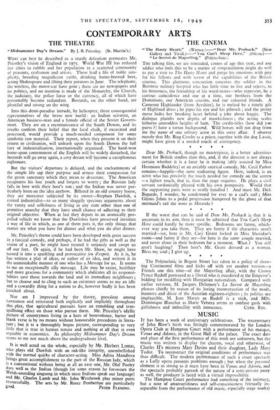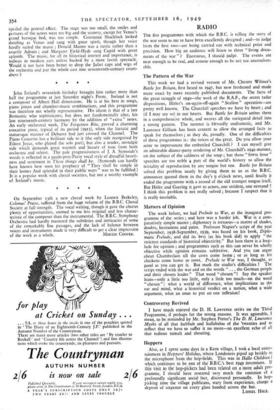MUSIC
IT has been a week of anniversary celebrations. The tercentenary of John Blow's birth was fittingly commemorated by the London Opera Club at Hampton Court with a performance of his masque, Venus and Adonis, in the Great Hall of the palace. The exact date and place of the first performance of this work are unknown, but the music was written to display the charms, vocal and otherwise, of Charles H's mistress Mary Davies and their daughter, Lady Mary Tudor. To reconstruct the original conditions of performance was thus difficult. The modern performance of such a court spectacle as a Lully opera presents problems enough ; but when the personal element is as strong as it must have been in Venus and Adonis, and the spectacle probably partook of the nature of a semi-private party as well, the producer is faced with a virtual impossibility.
The Hampton Court performance had something of the intimacy, but a note of amateurishness and self-consciousness (virtually in- separable from the performance of old music, especially stage works) spoiled the general effect. The stage was too small, the smiles and gestures of the actors were too big and the scenery, except for Venus's grand baroque bed, was too simple. Constance Shacklock looked dazzling as Venus and sang with great spirit, though her voice hardly suited the music ; Donald Munro was a rustic rather than a courtly Adonis ; and Margaret Field-Hyde sang Cupid with great aplomb. The music, for all its historical interest and importance, is tedious to modern ears unless backed by a more lavish spectacle. Would it not have been better to drop the Juliet caps and wigs of the orchestra and put the whole cast into seventeenth-century court- dress ?
John Ireland's seventieth birthday brought him rather more than half the programme at last Saturday night's Prom. Ireland is not a composer of Albert Hall dimensions. He is at his best in songs, piano pieces and chamber-music combinations, and this programme was therefore not wholly representative. His idiom is that of a late Romantic who sophisticates, but does not fundamentally alter, his late nineteenth-century harmony by the addition of " extra " notes.
early orchestral work, The Forgotten Rite, proved a charming evocative piece, typical of its period (1913), when the hieratic and statuesque manner of Debussy had just crossed the Channel. The Piano Concerto has a brilliant side to it (the only side recognised by Eileen Joyce, who played the solo part), but also a tender, nostalgic side which demands great warmth and beauty of tone from both orchestra and soloist. The pale progressiveness of J. A. Symonds's words is reflected in a paulo-post-Parry vocal style of dreadful hearti- ness and sentiment in These things shall be. (Symonds can hardly have known how soon his prophecy of "They shall be simple in their homes And splendid in their public ways " was to be fulfilled.) It is a popular work with choral societies, but not a worthy example of Ireland's music.
* * * On September 13th a new choral work by Lennox Berkeley, Colonus' Praise, suffered from the huge volume of the B.B.C. Choral Society at full strength. The vocal writing, though it gave the chorus plenty of opportunities, seemed to me less original and less charac- teristic of the composer than the instrumental. The B.B.C. Symphony Orchestra had hardly mastered the subtleties and intricacies of some of the remarkably fine passages, and the lack of balance between voices and instruments made it very difficult to get a clear impression MARTIN COOPER.
of the work as a whole.



































 Previous page
Previous page